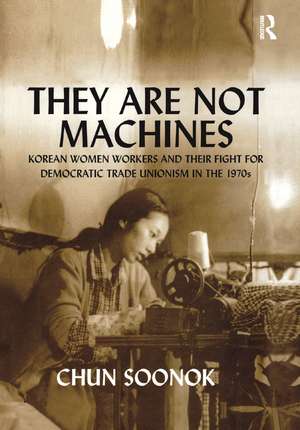They Are Not Machines: Korean Women Workers and their Fight for Democratic Trade Unionism in the 1970s
Autor Chun Soonoken Limba Engleză Paperback – 10 iun 2019
| Toate formatele și edițiile | Preț | Express |
|---|---|---|
| Paperback (1) | 311.76 lei 6-8 săpt. | |
| Taylor & Francis – 10 iun 2019 | 311.76 lei 6-8 săpt. | |
| Hardback (1) | 736.38 lei 6-8 săpt. | |
| Taylor & Francis – 10 sep 2003 | 736.38 lei 6-8 săpt. |
Preț: 311.76 lei
Preț vechi: 356.30 lei
-13% Nou
Puncte Express: 468
Preț estimativ în valută:
59.66€ • 62.21$ • 49.58£
59.66€ • 62.21$ • 49.58£
Carte tipărită la comandă
Livrare economică 21 martie-04 aprilie
Preluare comenzi: 021 569.72.76
Specificații
ISBN-13: 9781138378780
ISBN-10: 113837878X
Pagini: 228
Dimensiuni: 153 x 219 x 17 mm
Greutate: 0.42 kg
Ediția:1
Editura: Taylor & Francis
Colecția Routledge
Locul publicării:Oxford, United Kingdom
ISBN-10: 113837878X
Pagini: 228
Dimensiuni: 153 x 219 x 17 mm
Greutate: 0.42 kg
Ediția:1
Editura: Taylor & Francis
Colecția Routledge
Locul publicării:Oxford, United Kingdom
Cuprins
Contents: Foreword, Sohn Hak-kyu; Foreword, Han Myung-sook; Introduction; Park Chung-hee and the Yushin reforms; The conventional view; The Korean textile industry and the peace market; The past meets the future; Vulnerability at work; Trade union corruption and international reaction; Individuals and collective resistance; A painful birth and a violent death; Invisible women; Bibliography; Index.
Recenzii
Prize: 2005, runner-up, Best Sociology of Labour Book Award 2005, Labour and Labour Movements Section of the American Sociological Association ’...the contemporary South Korean labor movement has so far received scant attention from scholarly communities outside Korea...They Are Not Machines: Korean Women Workers and their Fight for Democratic Trade Unionism in the 1970s is a great addition to this tiny literature...a rare book...the most valuable part of the book is the detailed biographical account of Yi So-sun, the mother of all the workers...the story of this woman is utterly dramatic and deeply moving.’ Journal of Asian Studies ’The book is based on compelling and evocative accounts by the participants. It is woven together by the author in a way that captures both the wider picture of the political and economic events that underwrote the so-called economic miracle, as well as the very personal sufferings that enabled this miracle to occur. The book traces out the costs and the dilemmas that faced the leading participants, as well as the ordinary women who continued to labour in the sweatshops. This book is a powerful and compelling statement about industrialisation in the Asian region and it should have a broad audience.’ Professor Peter Fairbrother, Cardiff University, UK ’Chun’s book is a fascinating and worthy account of the often forgotten face of Korea’s economic miracle.’ Asia Pacific Business Review ’...this remarkable book...received a well-deserved honourable mention from the American Sociological Association section on labour and the labour movement as one of the best books in 2005 written about labour...Chun not only uncovers the previously ignored role of women in the Korean trade union movement but also challenges the conventional notion that the movement for democratic trade unions began in 1987.’ Korean Studies ’This impeccably researched and expertly written new book will undoubtedly assume its rightful place a
Notă biografică
Chun Soonok, born in 1954, is related to two major figures within the history of the labour movement in South Korea. Her brother, Chun Tae-il, poured petrol over himself in November 1970, sacrificing his life to draw attention to the inhumane treatment of Korea's garment workers. His last words were 'They are not machines'. This deed galvanised grass-roots opposition to the officially-sanctioned organization of labour and led to a new order in Korean industrial relations. Her mother, Yi So-sun, now in her 70s, has dedicated her life to the cause of human rights and democratic trade unionism and continues to play a leading role in representing the interests of workers. Chun Soonok began work in a sweat-shop garment factory in Seoul at the age of 16. Dismissed from several jobs for her trade union activities, she became involved in running a wide variety of welfare projects for workers in need. From the late 1980s she lectured on union affairs and women's issues in countries around the world. In 1989 she came to the UK to embark on a programme of study that culminated in the award of a PhD in 2001. She has been Visiting Fellow at the Cardiff University and is now research professor at Sungkonghoe University, Seoul, South Korea.
Descriere
Examining the dark underbelly of the South Korean 'economic miracle', Chun Soonok outlines the political and economic history of Korea in the 1960s and 1970s with female-staffed textile sweatshops at the forefront of economic development. Based on compelling personal accounts, this is the first published account of the women workers' struggle and it throws much light on the process of modernization and industrialization in Korea beyond.
